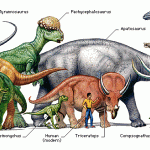Environment
Fronting the NY Times today is a preview of a bold new strategy for engaging hard to reach audiences on science. As the NY Times describes, today's media event that unveils the fossilized remains of the monkey like creature Darwinius masillae features a unique collaboration between the History Channel, the open-access journal PLoS One, and the American Museum of Natural History.
Along with today's publication at PLoS and the media unveiling at AMNH, there will be a two hour documentary on Monday at the History Channel, an exclusive arrangement with ABC News to appear on Good Morning America…
Andrew Alden at about.com received a question from a reader. She's in her second year studying geology in Australia, she likes hard rock stuff, she thinks mining and petroleum sound interesting, and she's worried about juggling it all with a small child.
I teach a fair number of non-traditional students, and I've got a number of advisees with small children. We talk about how to juggle coursework and kids a lot (especially when kids are sick, or schools have vacations), but I haven't had that many long talks with them about jobs (yet). There are geology jobs near my town - engineering geology…
Rumours are that a new Administrator for NASA may be named this week
h/t NASAwatch (comments are interesting)
General Charles Bolden (USMC)
Annapolis grad. 100+ sorties in an A6 Intruder in Vietnam.
Test pilot; shuttle pilot and commander - 4 trips including HST launch.
Assitant Deputy Administrator of NASA under Goldin.
Annapolis deputy; 1 MEF general in Kuwait during Desert Thunder ('98 air campaign);
wing commander.
He testified to the Senate subcommittee on Science and Space in 2006
He reportedly will meet with Obama today.
Could be nominated as early as this week, if all goes well.…
Sipping from the internet firehose...
This weekly posting is brought to you courtesy of H. E. Taylor. Happy reading, I hope you enjoy this week's Global Warming news roundup
skip to bottom Another week of Climate Disruption News Sipping from the internet firehose... May 17, 2009 Chuckle, World Ocean Conference, Ocean Circulation, Sol, Climate Project, Melting Arctic, Geopolitics, Antarctica Food Crisis, Food Production Hurricanes, GHGs, Carbon Cycle, Temperatures, Paleoclimate Impacts, Forests, Corals, Climate Refugees, Wacky Weather, Tornadoes, Wildfires, Floods & Droughts…
Water. Too much and you drown, not enough and you die of thirst. Getting it just right is important. But how?
One of the fears associated with global warming is that it could lead to droughts that could lead to wars. There was an essay in Nature in March that argued that those wars don't really happen - that countries trade virtual water when they import food. But is that really the case? Seed has a nice article today about just that. It brings together seven experts on water and international relations to address the question of water and conflict. The consensus, if you can ever get one from…
In honor of the Washington, DC Area Bicyclist Association and their annual Bike to Work Day (Friday, May 15)
by Reut Tenne
A couple of days ago, I announced to a few friends that I regret not participating in the District of Columbia's (DC) bicyclistsâ movement. I am not sure that there is such a thing, but I sure would have liked to create one. For the past two years, I have gotten myself everywhere with my little old bike, and it has become my pride and joy. When I bike down a street crowded with cars, I feel superior to all the drivers; I see them as…
Ok, you're probably thinking. Now she's really lost it. California's got earthquakes, volcanoes, landslides, coastal erosion, oil, gold, sinking ground, a funky inland delta with levees in danger of failing, major water issues... and that's not even getting into the really cool stuff, like serpentinites and blueschists and pillow basalts and forearc basin sediments and granodiorites.
Yeah. California's got plenty of geology, and plenty of problems related to its geology. And college-bound high school kids don't study it, because very few high school earth science classes count for admission…
In the comments of one of my snail eradication posts, Emily asks some important questions:
I'm curious about how exactly you reason the snail-killing out ethically alongside the vegetarianism. Does the fact that there's simply no other workable way to deal with the pests mean the benefits of killing them outweigh the ethical problems? Does the fact that they're molluscs make a big difference? Would you kill mice if they were pests in your house? If you wanted to eat snails, would you? Or maybe the not-wanting-to-kill-animals thing is a relatively small factor in your vegetarianism?
Killing…
Sipping from the internet firehose...
This weekly posting is brought to you courtesy of H. E. Taylor. Happy reading, I hope you enjoy this week's Global Warming news roundup
skip to bottom Another week of Climate Disruption News May 10, 2009 Chuckle, Top Stories:Aus-ETS, Sol, Melting Arctic, Geopolitics, Antarctica, Late Comments Food Crisis, Food vs. Biofuel, Food Production Hurricanes, GHGs, Carbon Cycle, Temperatures, Ozone, Paleoclimate, ENSO, Glaciers, Sea Levels, Satellites Impacts, Forests, Climate Refugees, Desertification, Wacky Weather, Tornadoes, Wildfires, Floods &…
Science Scout twitter feed
This is reprinted posting, but a few friends have ben asking me about traveling to Disneyland in light of the swine flu happenings. In any event, these discussions have reminded me of my own ponderings when my family visited the magic kingdom last year. Specifically, the above was a question that continually haunted my consciousness. Disneyland was remarkably pristine in that cookie cutter, artificial, yet aesthetically pleasing way, but it must be a major sink in terms of waste, energy consumption, carbon emissions, etc.
Or is it? Maybe in terms of…
tags: Birds in the News, BirdNews, ornithology, birds, avian, newsletter
BirdLife's newest flyways project will help to make one of
the world's most important bird migration flyways safer for soaring birds.
Image: Desert Vu.
Birds in Science and Technology
Zebra finches, which normally learn their complex courtship songs from their fathers, spontaneously developed the same songs all on their own after only a few generations. "We found that in this case, the culture was pretty much encoded in the genome," said Partha Mitra of Cold Spring Harbor Laboratory in New York, co-author of the…
Sipping from the internet firehose...
This weekly posting is brought to you courtesy of H. E. Taylor. Happy reading, I hope you enjoy this week's Global Warming news roundup
skip to bottom Another week of Climate Disruption News Another Week of Climate Disruption News Information overload is pattern recognition May 3, 2009 Chuckle, Top Stories:Major Emitters, IHDP, Central Asian Water, ADB Report, EGU, Tim DeChristopher Melting Arctic, Arctic Council, Geopolitics, Wilkins Disintegration, Climate Crunch, Late Comments Food Crisis, Food Production Hurricanes, GHGs, Carbon Cycle,…
Just as we have renamed fish to make them more marketable, there is a push in conservation (and science in general) to change certain uncommunicative terms to more lucid or dramatic ones. As an article in the NYTimes titled Seeking to Save the Earth, with a Thesaurus points out, it might be useful to replace "global warming" with "our deteriorating atmosphere", especially since conservationists (note: a shift from "environmentalists") are up against coal companies promising "clean, green coal".
In the same way the liberal party needed to begin using frames to manipulate public opinion (as…
Introducing The Clade. It has now been launched and you can read all about it and see the first contributions (and perhaps decide to join in and contribute yourself):
The Clade will bring together environmentally concerned writers, artists, photographers, videographers and podcasters who want to go beyond "environmentalism as usual." Environmentalism encompasses wilderness protection and human social justice, women's rights and artistic freedom, online organizing and solitary contemplation. We intend to reclaim environmental journalism from the Hearsts and Knight-Ridders of the world, to open…
Ever since I started this little vanity bit known as Your Friday Dose of Woo, lo, these nearly three years ago, when I introduced the waiting blogosphere to the woo-tastic quantum homeopathic stylings of Lionel Milgrom, I've occasionally wondered if I had started out with too much woo. I mean, Milgrom is a really hard act to follow, so densely does he blend together the most amazing hard core homeopathic woo combined with quantum pseudoscientific posturings that put Deepak Chopra to shame, all tied together with the most awesomely dense, yet ultimately meaningless, equations that look like…
[This is a repost from the Myrmecos Blog, originally published February 2008]
In 1934, a diminutive book by an unknown author seeded the largest conservation movement in history. The book, Roger Tory Peterson's A Field Guide to the Birds, pioneered the modern field guide format with crisp illustrations of diagnostic characters, all in a pocket-sized read. The Guide sold out in a week, but the book's effects are ongoing.
To understand the magnitude of Peterson's impact, consider how naturalists traditionally identified birds. They'd take a shotgun into the field, and if they saw something…
For over 100 million years, dinosaurs, and not mammals, were the dominant form of life on Earth. The pinnacle of evolution at the time, dinosaurs filled the niches of being the largest, most differentiated animals -- herbivores and carnivores both -- on the planet. As you well know from seeing their fossils, they would dwarf their modern, mammalian counterparts if they were still alive today.
But they're not still alive today, because a mass extinction event occurred 65 million years ago. And the fossil record indicates that it occurred all at once, which is unusual. The Earth was overrun…
Sipping from the internet firehose...
This weekly posting is brought to you courtesy of H. E. Taylor. Happy reading, I hope you enjoy this week's Global Warming news roundup
skip to bottom Another week of Climate Disruption News April 26, 2009 Chuckle, Top Stories:CARB-LCFS, Indigenous Peoples' Summit, EGU, G8 Meetings, Major Economies Forum, Methane Melting Arctic, Geopolitics, Antarctica, Weight, Kash4Klunkers, Aerosols, Earth Day, Sol, Abruptness Food Crisis, Food vs. Biofuel, Food Production Hurricanes, GHGs, Carbon Cycle, Ozone, Paleoclimate, Sea Levels Impacts, Forests, Corals,…
On page 19 of Heaven and Earth we find Plimer making this remarkable claim about one of the authors of the IPCC's 2nd Assessment Report's chapter on the impacts of global warming on health:
Other authors were environmental activists, one of whom had written on the health effects of mercury poisoning from land mines. If a land mine explodes, the last thing one thinks about is the health effects of mercury poisoning.
Yes, that's just crazy. Let's see what Plimer's source, Paul Reiter's submission to a House of Lords committee says:
One of these activists has published "professional" articles…
I feel I'd be neglecting my duties to those few readers of mine who don't read enough other sources if I didn't at least mention Andy Revkin's piece in today's New York Times. An anonymous lawyer slipped him, in what would have once arrived in a brown paper envelope, a document unearthed in a California lawsuit. It doesn't tell us anything we didn't already know, generally speaking, but it's always good to be able to point to specific evidence when you summarily dismiss an entire industry as untrustworthy.
Here's what a coalition of coal, oil and auto industries said their scientific advisers…


